外研版必修1 Module 6 The Internet and Telecommunications 非谓语动词训练课件(93张)
文档属性
| 名称 | 外研版必修1 Module 6 The Internet and Telecommunications 非谓语动词训练课件(93张) |  | |
| 格式 | zip | ||
| 文件大小 | 741.1KB | ||
| 资源类型 | 教案 | ||
| 版本资源 | 外研版 | ||
| 科目 | 英语 | ||
| 更新时间 | 2019-07-10 07:24:11 | ||
图片预览

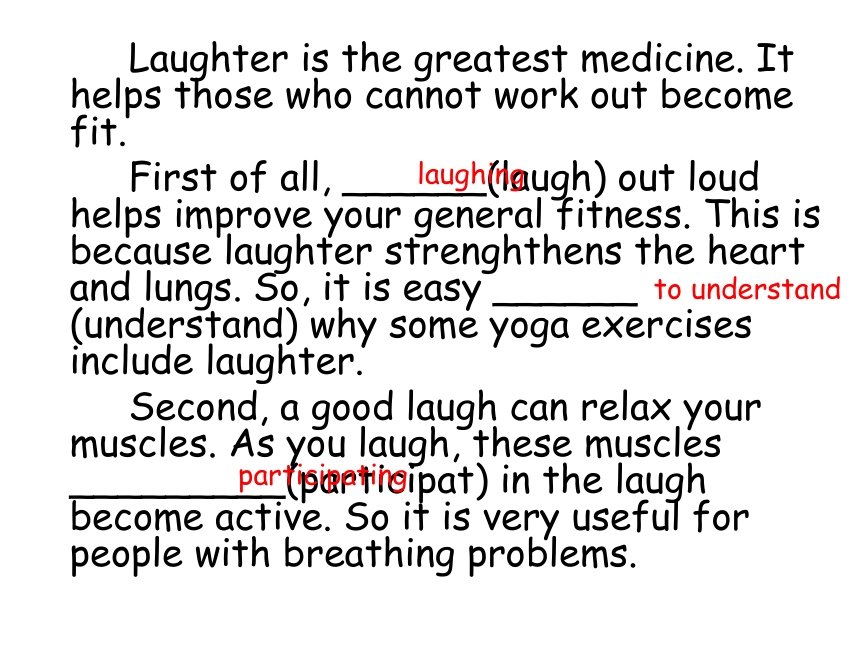
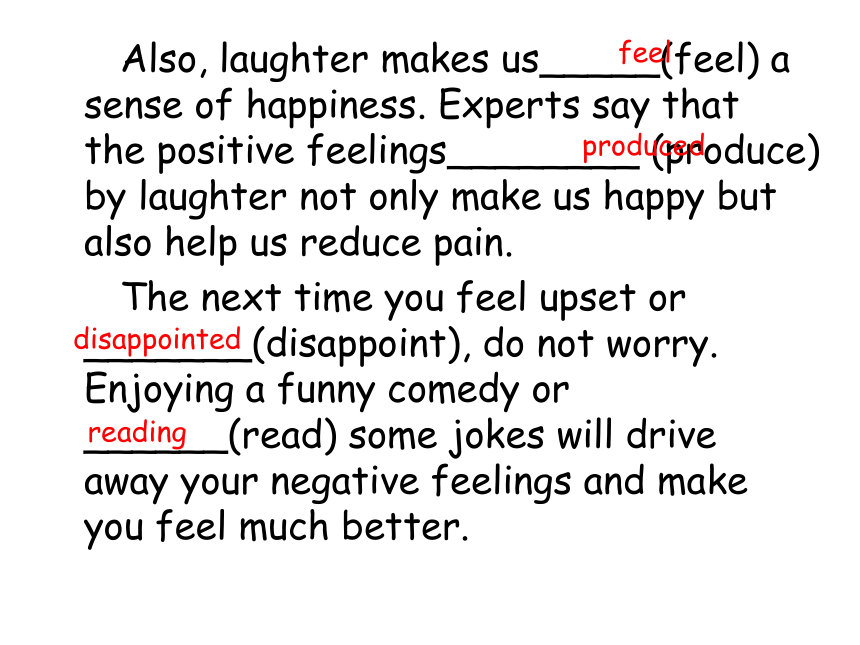
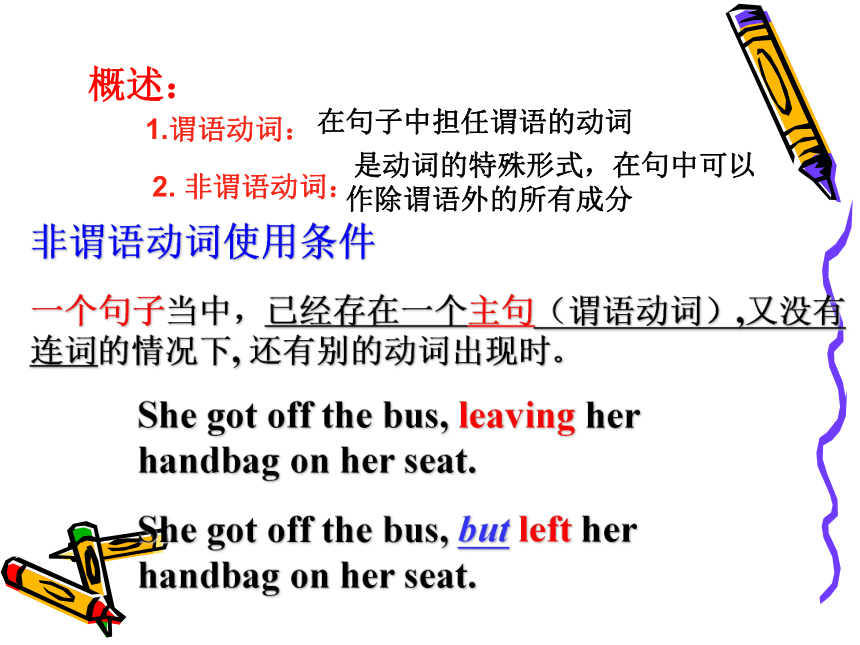
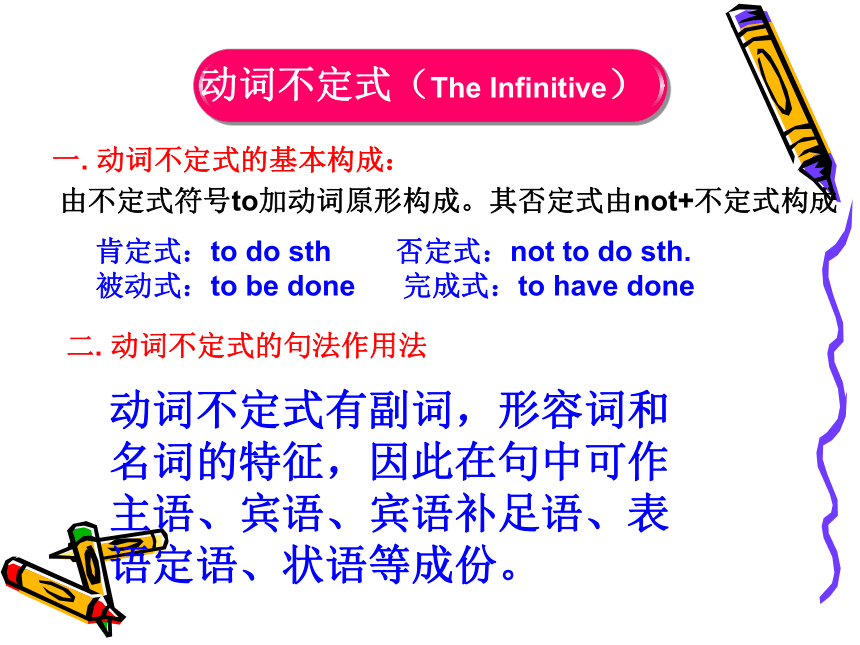
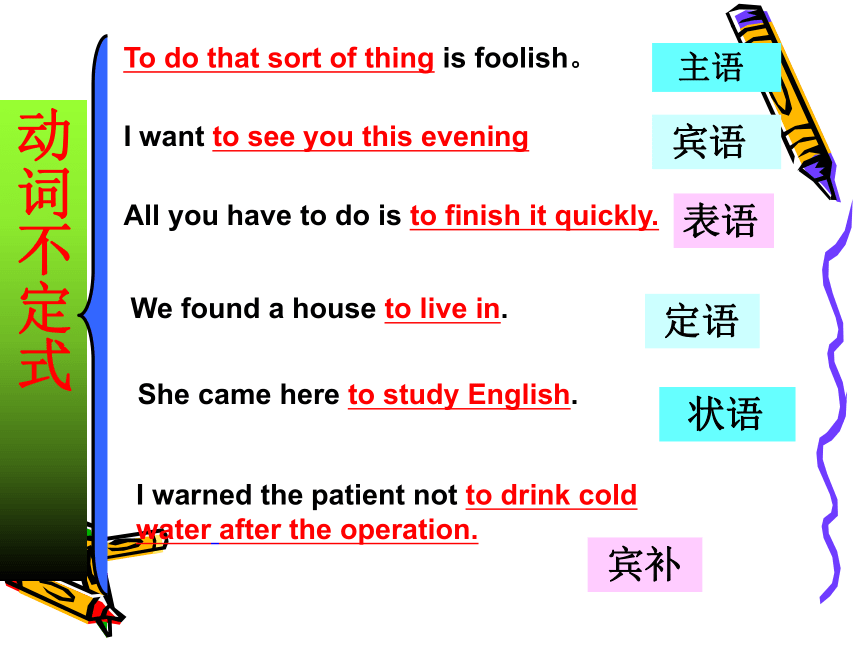
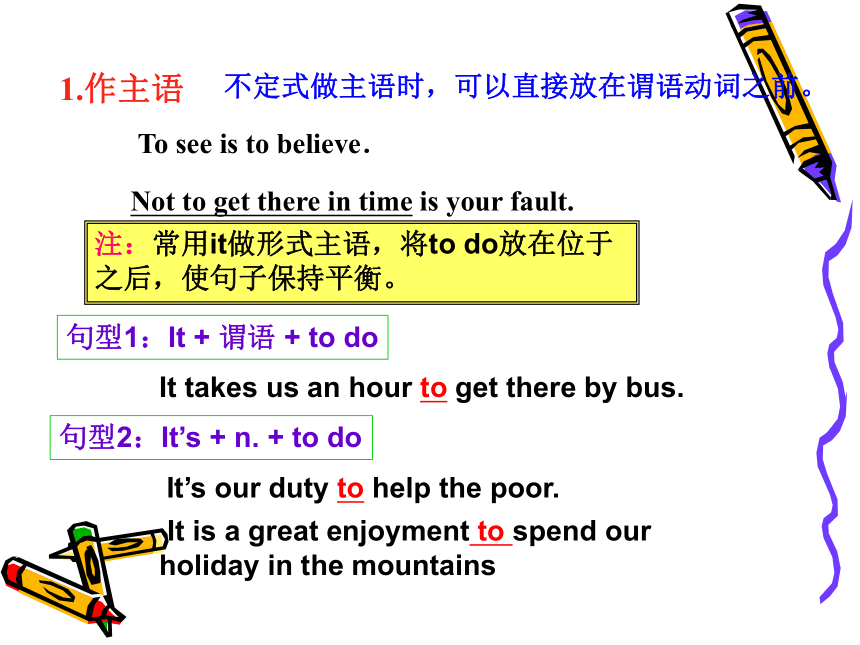

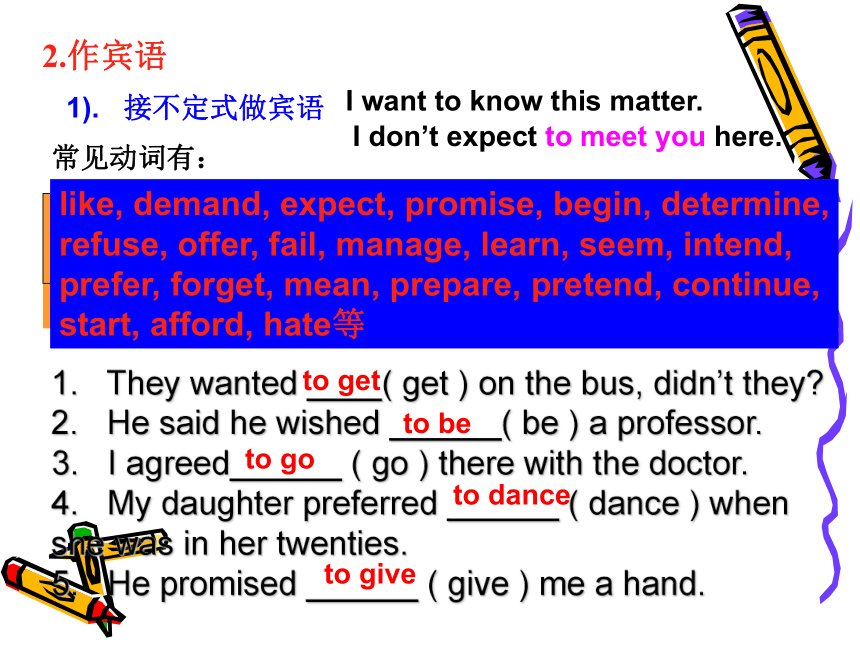
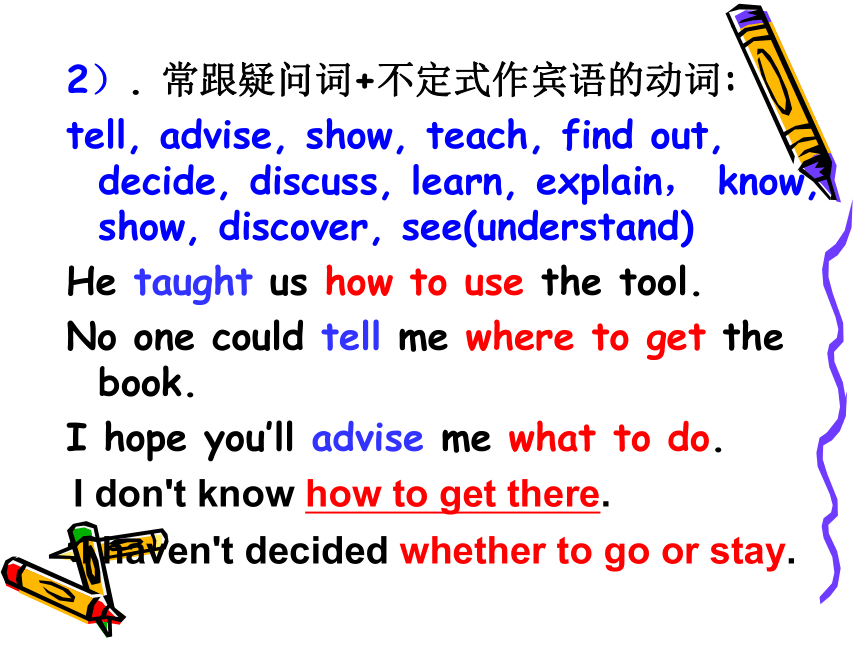

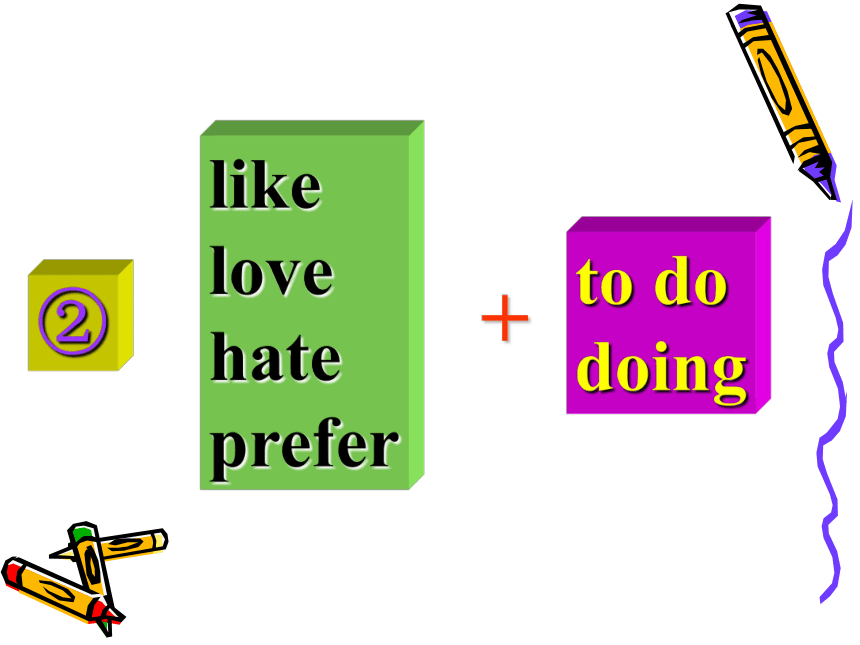
文档简介
课件93张PPT。非谓语动词Nonfinite Verbs Laughter is the greatest medicine. It helps those who cannot work out become fit.
First of all, ______(laugh) out loud helps improve your general fitness. This is because laughter strenghthens the heart and lungs. So, it is easy ______ (understand) why some yoga exercises include laughter.
Second, a good laugh can relax your muscles. As you laugh, these muscles _________(participat) in the laugh become active. So it is very useful for people with breathing problems.laughingto understandparticipating Also, laughter makes us_____(feel) a sense of happiness. Experts say that the positive feelings________ (produce) by laughter not only make us happy but also help us reduce pain.
The next time you feel upset or _______(disappoint), do not worry. Enjoying a funny comedy or ______(read) some jokes will drive away your negative feelings and make you feel much better.readingdisappointedproducedfeel1.谓语动词:概述:2. 非谓语动词:在句子中担任谓语的动词 是动词的特殊形式,在句中可以 作除谓语外的所有成分一个句子当中,已经存在一个主句(谓语动词),又没有连词的情况下, 还有别的动词出现时。非谓语动词使用条件She got off the bus, leaving her handbag on her seat.
She got off the bus, but left her handbag on her seat.动词不定式(The Infinitive)一. 动词不定式的基本构成:由不定式符号to加动词原形构成。其否定式由not+不定式构成 肯定式:to do sth 否定式:not to do sth.
被动式:to be done 完成式:to have done二. 动词不定式的句法作用法动词不定式有副词,形容词和名词的特征,因此在句中可作主语、宾语、宾语补足语、表语定语、状语等成份。动词不定式To do that sort of thing is foolish。I want to see you this eveningAll you have to do is to finish it quickly.We found a house to live in.She came here to study English.I warned the patient not to drink cold water after the operation. 主语 宾语表语 定语 状语 宾补1.作主语 不定式做主语时,可以直接放在谓语动词之前。To see is to believe. Not to get there in time is your fault.注:常用it做形式主语,将to do放在位于之后,使句子保持平衡。句型1:It + 谓语 + to doIt takes us an hour to get there by bus.句型2:It’s + n. + to doIt’s our duty to help the poor. It is a great enjoyment to spend our holiday in the mountains句型3:It is adj. for/of sb. to do sth.It is + adj + for sb to do sth
It is + adj + of sb to do sth(是形容人的品质的 )(是形容事物的性质的 )It is easy for me to finish this work before ten.
It is a great honor for us to be present at your
birthday party. It is very kind of you to give me some help.
It's impolite of you to speak to the teacher like that.=You are very kind to give me some help. =you are impolite to speak to the teacher like that. 常见动词有:2.作宾语 I want to know this matter.like, demand, expect, promise, begin, determine, refuse, offer, fail, manage, learn, seem, intend, prefer, forget, mean, prepare, pretend, continue, start, afford, hate等I don’t expect to meet you here.1).接不定式做宾语1. They wanted ____( get ) on the bus, didn’t they?
2. He said he wished ______( be ) a professor.
3. I agreed______ ( go ) there with the doctor.
4. My daughter preferred ______ ( dance ) when she was in her twenties.
5. He promised ______ ( give ) me a hand.to getto beto goto danceto give2). 常跟疑问词+不定式作宾语的动词:
tell, advise, show, teach, find out, decide, discuss, learn, explain, know, show, discover, see(understand)
He taught us how to use the tool.
No one could tell me where to get the book.
I hope you’ll advise me what to do.I don't know how to get there.I haven't decided whether to go or stay. begin
start +to do
doing注意下列动词①②like
love
hate
prefer+to do
doing③remember
forget
regret+to do
doing④try
mean
stop
go on
continue+to do
doing1. Boys, don't forget _____ the windows before you leave the classroom. A. closing B. closed C. to closing D. to close
2.She reached the top of the hill and stopped _______ on a big rock. A. to have rested B. resting C. to rest D. rest
3. Remember _______ the lights when you leave the office.
A. to turn off B. turning off C. turn off D. to turning off1)、主语 + be + to do sth
主语多为 duty / wish / hope / idea / plan / ambition/ dream / work / job 等 名词 1、My ambition is to be a singer.
2、His work is to clean the classroom every day.3.作表语我的梦想是成为一名歌手。
他的工作是每天清扫教室。4.作宾语补足语(与宾语之间的关系实际上是逻辑上的主谓关系)1. Mother?told?me?___?come?back?before?
10?o’clock. 2. I’ll?get?someone?___?repair?the?recorder?
for?you. 3. What?caused?him?___?change?his?mind? 4.I?wish?you?___?come?as?soon?as?possible.
5. He asked me ___do the work with him. to to to to toadvise allow ask
beg cause expect
encourage force
get hate invite
order wish?
want warn remind
promise permit
persuade request…sb. to dosee
watch
look at
hear
listen to
feel
notice+sb. +do
doing
donemake let
havesb. beseen
watched
looked at
heard
listened to
felt
noticed+to do made
let2).I?often?hear?them?(sing)?this?song. Did?you?notice?anyone?(come?)in?? I?would?have?him?(wait)?for?me?for?a?long?time. Look?at?the?horse?jump. 注意:?当这类动词转为被动语态时,?其后的不定式则要加上“?to”?如: He is often heard ________ the song·?He?was?seen?_______?the?room. to singto?enter5. it作形式宾语I find/feel to work with him interesting .I find/feel it interesting to work with him.注意:不定式短语作宾语时,如果还带有宾语补足语,往往把不定式宾语放在宾语补足语之后,而用it作形式宾语。 Subject+ find/think/feel/make/ consider… it
+adj/n + to do sth. 1.We?thought?___?better?___?start?early. 2.Do?you?consider?___?better?not?__?go?
3.?I?feel?__?my?duty?__?change?all?that.
4.We think __ important __ obey the law.
5.I know __ impossible __ finish so much homework in a day. itto it it it ittotototo用括号内所给动词的适当形式填空,使句子完整、正确。
1.Let me ______(help) you _______ (water) the flowers.
2.Little Sandy would love _______(take) to the cinema this evening.
3. Though he often made his deskmate ______(cry), today he was made _______(cry) by his deskmate.
4. I saw him _______ into the small store. A. went B. going C. to go D. has gone
5. Tell the boy _______ out of the window.
not to look B. to not look C. don't look D. not look help(to)waterto takecryto cry 6.?作定语
不定式与它所修饰的词有动宾关系
Do you have anything to wash today?
Do you have anything to be washed today? (区别主被动)
不定式用来说明所修饰词的内容
I have no chance to go there.
被修饰词是不定式的逻辑主语
She is the last to leave the room.
不定式为不及物动词时,须加介词
He is looking for a room to live in.
1.The house is not big enough for us all_______. A. to live in B. to be lived in C. to live D. for living in
2. Would you please pass me the knife _______? A. to cut the fruit with B. to cut the fruit? C. cutting the fruit D. cutting the fruit with
3.I have something important to say.please find a piece of paper (写上)
4.Excuse me,could I use your pen for a moment?
I have no pen (写)to write onto write with动词不定式做定语7. 不定式作状语1)不定式作目的状语
Tim sat near the fire to get warm.
The athletes practised hard to win the match.为强调作作目的状语的不定式, 常用in order (not) to,so as (not) to短语.前者可放在句首,也可放在句中;后者只能放在句中2).不定式作结果状语
作结果状语的不定式常用于一些固定搭配中如:too …to, enough to,only to,never to,so + 形容词/副词 + as to, such + 名词+ as to do引导。
Ilifted a stone , only to fall down my feet.
I tried the door, only to find it locked inside.
(强调意外结果)
He is brave enough to go out alone at night
It is too heavy to carry.3). 不定式作原因状语
常放在表示心理感觉的形容词后,说明产生这种情绪的原因
I am happy to see you.
She was sad to hear the bad news.
I’m anxious /eager to know the result.
常用的形容词有
able, content ,willing, free, happy, glad, lucky, sorry , angry, sad, rude, foolish, clever …不定式主动表被动不定式有时用主动语态表示被动含义
1.在there be 句型中
There is no time to lose.
There is something to pay attention to .
2 .当不定式修饰want, have 等动词的宾语,而句子的主语是不定式的逻辑主语时用主动语态表示被动含义
We have no homework to do.
Mary has three children to look after.
3. 当不定式和其逻辑主语是被动关系,但不定式前有形容词时,不定式用主动语态表示被动含义(常见的: easy, hard, difficult, fit, heavy, comfortable,…)
This job is hard to do.
He is not easy to convince.
他不容易被说服
4.某些动词, 如to let, to blame (责备)用主动式表被动意义。 Who is to blame for it? 这得怪谁?The house is to let. 这房子要出租。不定式的独立成分To tell the truth, to be frank, to make matter worse, to be sure, to be exactly to be honest, to be brief….
To be frank, you are lying.
To make matter worse, it began to turn dark.
To tell the truth, I don’t think the film is good.1. -ing的构成 ??? -ing是由动词原形加词尾-ing构成。-ing同样有时态和语态的变化,通常有下表几种形式(以do为例):
? 主动形式 被动形式
一般式 doing being done
完成式 having done having been done
-ing的否定形式是由not 加-ing分词构成。 Not knowing his address, I could do nothing but stay at home and wait. His not coming made all of us angry.??
V-ing2. -ing的语法作用?? ??? -ing一方面具有动词的性质,另一方面也相当于一个名词或形容词、副词,在句中可以作主语、表语、宾语、定语、状语和补语等。 ?1) –ing(短语)作主语: Laying eggs is the ant queen’s full-time job.?? Saying is easier than doing.?? 为了保持句子平衡,通常用作形式主语,而把真正的主语放在句末。如: It is no use crying over spilt milk.?? It's a waste of time arguing about it.?2) -ing(短语)作表语: His hobby is collecting stamps.?? The problem is quite puzzling.?? ?
-ing作表语的两种不同含义: ? ①-ing作表语可以表示主语的内容是什么。如: Their job is building houses.他们的工作是盖房子。 The real question is getting to know the needs of the people.?????? 真正的问题是了解人民的需要。 ②-ing作表语还可以表示主语所具有的特征。如: This story is very interesting.?? 这故事很有趣。 The problem is quite puzzling.这个问题很令人困惑。3) -ing作宾语: ①–ing作动词宾语。
I suggest doing it in a different way.??
We enjoy attending Mr Ma's class.?? ②-ing作宾语也可用在复合宾语中作真正的宾语,而用it作形式宾语。如: I think it no good living in such a cold place.??????
Do you consider it no use trying again???
高中阶段能接-ing作宾语的常见动词: mind(介意), suggest(建议), enjoy(欣赏,), admit(承认), appreciate(感激,欣赏), avoid(避免), delay(推迟), dislike(不喜欢,厌恶), escape(逃脱), finish(完成), forgive(宽恕), imagine(想象), keep(保持), miss(错过), practise(训练), resist(抵抗,抵制), risk(冒险), deny(拒绝,否认), consider(考虑)等。 ③-ing作介词宾语,经常用在一些短语的后面。如:I'm against inviting him to dinner.?? They don’t feel like walking that much.?? He went to London in the hope of being a famous painter.????
look forward to, be proud of, be responsible for ,
insist on , think of ,dream of , object to, hear of,
prevent…from, keep…from, stop…from,
be engaged in, depend on, thank…for,
excuse…for, aim at, devote…to, set about(着手做), be/get used to, be fond of, be afraid of, be tired of, succeed in, be interested in, be ashamed of?注意:在有些句子中,介词常可省去。如: I have no difficulty (in) communicating with foreigners.??????
He used to spend a lot of time (in) playing games.?? 。 What can prevent us (from) getting married??? ? ??? 另外,-ing可以和一些介词如in, on, after, against, before, by, for, without, besides等构成短语,在句中作状语。如: He left ahead of time without saying a word.??????
Besides cooking and sewing, she had to take care of four children. ?On hearing the news, all the pupils jumped with joy.?????? 4) -ing作定语: ①单个的作定语一般放在被修饰词的前面。如: reading room?? swimming pool?? singing competition
waiting room? sleeping bag? ?? ?? ?
the exciting news?
a boring speech??? ?? a sleeping child?????-ing作定语的两种不同含义:?? ①–ing作定语可用来说明被修饰的名词的用途和性能。如:reading material?? 阅读材料 walking stick?? 手杖?????? fishing pole?? 鱼杆
flying suit?? 飞行服? ??
writing table?? 写字台?????listening practice??
听力训练②-ing作定语还可以表示所修饰的人或物的动作或状态,在意思上接近一个定语从句,可以表示正在进行的动作,也可表示经常性动作或当时的状态。如: developing countries = countries that are developing?? 发展中国家 a growing city = a city that is growing?? 发展着的城市 an ordinary-looking house = a house that looks ordinary??
看起来很普通的房子 a touching story = a story that is touching??
一个动人的故事 working people= people who are working?? 劳动人民
②-ing短语作定语应放在被修饰词的后面,也相当于一个定语从句。如: Who is the comrade standing by the door??? They lived in a house facing south.?? 5) -ing做状语:?? ??? -ing作状语可以表示时间、原因、结果、条件、让步、方式或伴随情况等。 ①-ing短语作时间状语,相当于一个时间状语从句,有时可由连词when, while引出。如: While reading the book, he nodded from time to time.? ??????
Seeing those pictures, she remembered her childhood.?????
②-ing短语作原因状语,相当于一个原因状语从句。如: Not knowing his address, I can’t send this book to him.??????
Many of us, being so excited, couldn’t go to sleep that night.???③–ing短语作结果状语。如: His father died, leaving him a lot of money.??
She was so angry that she threw the toy on the ground, breaking it into pieces. ?????? ④-ing作伴随状语,可以放在句子的前面、后面或中间,表示主语的另一个、较次要的动作。如: They stood there for half an hour watching the stars in the sky.???
Following the old man, the young people started walking slowly. ?????? ?⑤-ing间或也可作条件状语和让步状语,
相当于一个状语从句。如: Standing at the foot of a high mountain, a person
will find himself very small. ?????? Knowing all this, they made me pay for the damage.?????
? 注:-ing作状语时,它的逻辑主语就是整个
句子的主语。 ⑥“with/without+名词普通格或代词宾格+-ing分词”
结构在句中作状语,表示伴随情况或时间、原因等。如: His hair became grey with the years passing.??
Without anyone noticing, he slipped through the window.?????? 6) -ing作宾语补足语: ①--ing可以在see, hear, notice, watch, feel, look at, listen to, observe, have, get, leave, keep, set, catch, find等动词后面和一个名词或代词构成一个复合宾语,作宾语补语。如: I noticed a man running out of the bank when I got off the car. ???Last night the shopkeeper caught a child stealing some food in the shop. ?????? ②上面这类句子也可变成被动语态,这时,-ing分词可看成是主语补语。如: We were kept waiting for quite a long time.?? Jily was never heard singing that song again.?5. -ing的复合结构: ??? -ing分词的复合结构通常由物主代词、人称代词宾格、名词所有格+-ing分词构成,在句子开头时必须用物主代词和名词所有格,通常在句中作主语和宾语。如: His coming made us very happy.??
He was awakened by someone’s knocking at the door.?? ? 高中阶段有一些固定的-ing短语,如generally speaking(一般来说), judging from…(根据……来判断), considering…(考虑到……), talking of…(谈到……,提到……), supposing…(假如……)等,它们的逻辑主语和句子的主语不一致。这种短语可以被称之为句子的状语,也可当作一个插入语。如: Judging from his accent, he must come from Canada.??????
从他的口音看他一定来自加拿大。 Considering how poor he was, we decided to let him attend the concert for free. ?考虑到他是多么的穷,我们决定让他免费听音乐会。
选择填空: 1. The officers narrowly escaped ______??in the hot battle. A. have killed????? B. to kill?????????C. to be killed????????D. being killed 2.???___?? ?the letter, he went out to post it. A. Writing??????B. Being writing???? C. Having written??????D. Written 3. Don't you remember ??_______??????? ? A. seeing the man before????????? B. to see the man before C. saw the man before?????????? D. to have seen the man before 4. People couldn't ?help ???______???the foolish emperor in the procession. A. laugh at?????? B. to laugh at??????C. laughing at?????D. laughing on 5. We’re looking forward ?_____ ???the photo exhibition. A. to visiting ????B. to visit?????C. to having visited ????D. to visiting DCACD6. The girl ??___?under that tree is my sister. A. sitting??????????? B. sits?????????? C. is sitting????????? D. sat 7. This sentence needs ???_____???????? . A. a improvement??????B. improve?????C. improving????? D. improved 8. ?______?? ?anything about the accident, he went to work as usual.. A. Not known???? B. Known not?C. Knowing not????D. Not knowing 9. The next morning she found the man ?????________? ??in bed, dead. A. lying????????B. lie???????? C. lay??????????? D. laying
10. There was terrible noise ???_____??? ?the sudden burst of light. A. followed? B. following??? C. to be followed???? D. being followed 11. The secretary worked late into the night, ??___? ?a long speech for the president. A. to prepare?????B. preparing????? C. prepared?????D. was preparing ACD
ABB12. ?“Can't you read?” Mary said ??___?? ????to the notice. A. angrily pointing?????????? B. and point angrily ??
C. angrily pointed????????????? D. and angrily pointing 13. How about two of us ????___?? ?a walk down the garden? A. to take?????? B. take????? C. taking????? D. to be taking 14. ---I must apologize for ?_______???ahead of time.??? ---That’s all right. A. letting you not know??????????????? B. not letting you know C. letting you know not??????????????? D. letting not you know 15. ---You were brave enough to raise objections at the meeting.?
---Well, now I regret ?_____? ?that. A. to do?????? B. to be doing ?????? C. to have done?????? D. having done ACBD16. Would you ??________??? ?me your identification card, sir? A. mind to show????? B. mind showing???
C. trouble to show ?????????? D. trouble showing 17. He suggested ????____? ???on Saturday. A. to have a meeting????????????? B. having a meeting???
C. a meeting to have????????? D. that having a meeting 18. It is no good ?_______? ??to come now. He is busy. A. if you ask him???????? ? ? B. to ask him???
C. asking him?????????????? D. that you ask him 19. Although punctual himself, the professor was quite used ???_____? ?late for his lecture. A. to have students????????????????????? B. for students to be C. for students’ being????????????????? D. to students’ being BBCD 21. ___??for several weeks, the city needed food. A. As having flooded????????????? B. being flooded?????
C. Having been flooded?????????D. To flood
22.?? ____? ?ill worried my parents greatly. A. I fell??????? B. Me falling ??????? C. My falling??????????????D. I falling CC23. She is writing a letter to a friend of hers, ????____? ?him to attend the meeting. A. having invited?????????????????? B. inviting?????????????
C. to invite????????????? D. invited 24. Our town has dozens of factories, ?_____??several saw mills. A. included??????????? B. are including?????
C. are included???????????D. including 25. _____ ?the classroom, the students went to the playground to watch the football match. A. To clean??????????????? B. Having cleaned?? ???
C. Cleaned??????? D. Cleaning
BDB过去分词 The Past Participle 1. 过去分词具有动词的性质,同时兼有形容词或副词的性质,可以拥有自己的逻辑主语,在句中可以作表语、定语、状语和补足语。Explanation2. v-ed表示动作已经完成或被动意义eg: fallen leaves落叶(已落下的叶子)eg: I heard the door closed.我听见门被关上了。3. 否定式:not + v-edeg: He escaped, not seen by anyone.过去分词所充当的成分:一、作表语 (predicative)1. 过去分词作表语,表示主语的心理感觉或所处的状态,其用法相当于adj.,放在系动词后面。eg: The door remained locked till 7 o’clock.eg: I am pleased with the result of the experiment.(许多v-ed形式已经被当作adj.使用, 如: excited, disappointed, moved, puzzled,lost等)注意区别:2. v-ed作表语时,与系动词一起构成的系表结构与普通的被动语态在形式上相似。系表结构中的v-ed表示:
被动语态中的v-ed表示:主语所处的状态一个被动的动作eg: The cup is broken.
The cup was broken by Tom.系表结构表状态被动语态表动作注意比较:3. 过去分词v-ed和v-ing作表语的区别:过去分词v-ed:
现在分词v-ing:表主语(人)所处的心理状态,
个人的感受. “(人)感到...”表主语(物或人)所具有的特征.
“(物或人)令人...”eg: surprised/ surprising;
encouraged/ encouraging; moved/ moving...
二、作定语 (attribute)1. 前置定语:单个的v-ed作定语,一般放在被修饰的n.之前;
后置定语:v-ed短语作定语时,常被放在被修饰的n.之后,相当于一个定语从句。eg: an honored guest 一位受尊敬的客人eg: The injured bird lay on the ground.eg: The boy named Tom is my brother.eg: a letter written in blue ink注意:如果被修饰的词是复合不定代词或指示代词those等时,即使是一个单一的分词作定语也要放在被修饰的词之后。eg: There was nobody invited here.2. v-ed作定语与定语从句的互换:(1) 若是vt.的过去分词作定语表示已经完成的动作,且含有被动意义,可改成v.用被动形式的定语从句。eg: The letter posted today will reach you in a week. =The letter which was posted today will...(2) 若是vi.的过去分词作定语只表示动作的完成,不表被动,可改成v.用完成时态的定语从句。eg: a retired teacher = a teacher who has retiredeg: the fallen leaves=the leaves which have fallen注意:分词的完成式一般不作定语,若要表达完成意义常用定语从句。我们一般不说 The girl having won the race is my friend.而常说:The girl who has won the race is my friend.Exercise:1. Prices of daily goods ____ through a computer can be lower than store prices.
A. are bought B. bought
C. been bought D. buyingB2. With a lot of different problems ____,
the newly-elected president is having
a hard time.
A. settled B. settling
C. to settle D. being settledC3. When I got back, I saw a message ____ to the door____ “Sorry to miss you; will call later.”
A. pin, read B. pinning, reading
C. pinned, reading D. pinned, read C. pinned, reading三、作宾补 (Object Complement)v-ed作宾补,表示被动意义或已完成意义,或两者兼而有之。作宾语补足语的过去分词与宾语有逻辑上的被动关系。v-ed作宾补的几大类型的v. :1. 在make, get, have, keep, leave等使役动词后面作宾补:eg: Please keep us informed of the latest news. 请随时把最新消息告诉我们。eg: When you speak, you have to make yourself understood.说话时要让人听得懂。注意:在have + n./ pron. + 过去分词,即have sth. done这一结构中,have通常有三种意义。eg: I usually have my clothes washed on Sundays, but I don’t wash my clothes myself.(1) 表示“让某人做某事”,v-ed动作的执行者通常不是句子的主语。eg: The museum had everything robbed of in the war.eg: I have had my bike repaired.(2) 表示“遭遇到某种不幸,受到打击”,
v-ed动作的执行者不是句子的主语,
而是主语受到这种动作的影响。eg: The old man had his leg broken in the accident.(3) 表示通常意义的“有”。eg: We had a lot of books left in the classroom.2. 在see, hear, watch, notice, feel, find, think等感官动词或表示心理状态的动词后面作宾补:eg: I saw the thief caught by the policeman.eg: We can hear the windows beaten by the heavy rain drops. 3. 在would like, want, like, wish, order, expect, request等表示“希望,想要、要求”的v.后面作宾补:eg: The boss wouldn’t like the problem discussed at the moment.eg: We wished the problem settled at once.4. 在介词with/ without + n./ pron. + v-ed结构中。宾语宾补(宾语和宾补之间有被动关系)eg: The thief was brought in with his hands tied behind his back.eg: They left without a plate untouched.他们走了,没有一盘菜没动过。注意: with/ without + n./ pron. + v-ed这一结构在整句话中是作状语的,表原因,结果,方式或伴随情况。四、作状语 (Adverbial)v-ed作状语,它与主句的主语构成被动关系,表示被动的或已完成的动作。此时可以表示原因、时间、条件、让步、伴随情况等,相当于一个状语从句。v-ed作状语的几大类型:(1) 作原因状语,相当于as, since, because引导的原因状语从句.eg: Deeply moved by the film, we all cried. =As we were deeply moved by the film, we all cried.(2) 作时间状语,相当于when, while, before, after引导的时间状语从句.Asked how he broke into the room, he made no answer.=When he was asked how he broke into the room, he made no answer.(3) 作条件状语,相当于if, unless, once引导的条件状语从句.eg: Given more time, we would do the work better.=eg: If we were given more time, we would do the work better(4) 作方式或伴随状语,可位于句首或句末,可扩充为并列句。eg: The actress came in, followed by her fans.=The actress came in, and was followed by her fans.(5) 作让步状语,有时可以与although, though, even if, even though等连用eg: Much tired, my parents still kept on working.=Although they were much tired, my parents still kept on working.eg: Though beaten by them, we were not discouraged.=eg: Though we were beaten by them, we were not discouraged. be absorbed in be exposed tobe compared to/with
be faced with
be caught in ( compare) with Tom, Jack works harder.
( catch) in the rain, he was late for class.
(face )with difficulty, he never gives in.
Compared CaughtFaced 分词作状语受到系表结构固定短语的影响 be lost in(专注于)be tied of(厌烦) be exhausted by(筋疲力尽)be worried about (担心)be astonished at(惊讶)be moved by (感动)be determined to(决心做)be surprised at, be excited with/at/about…分词作状语受到系表结构固定短语的影响比较: v-ed, v-ing, to do作状语的用法(1) v-ed作状语表示:被动的或已完成的动作(2) v-ing作状语表示:主动的和正在进行的动作,即动作由句子的主语发出,并和谓v.的动作同时发生(3) to do作状语表示:主动的动作,常作“目的,原因,结果”状语Exercises:1. ________ with other architecture, this building is special.
2. ________ to other women, she was very lucky.
3. ________ different cultures, we often pay attention only to the differences without noticing the many similarities.
A. Compared B. Being compared
C. Comparing D. Having comparedACA独立主格结构 一般来说,分词或分词短语作状语,其逻辑主语要和句子的主语一致。但有时候,分词的动作不是由句子的主语发出来的,它有自己的逻辑主语。
独立主格结构(Independent Genitive)有两部分组成,前一部份是名词或者代词,后一部分是非谓语动词(不定式、动名词和分词)或形容词、副词、或介词短语。前后两部分具有逻辑主谓关系。独立主格结构在句中做状语,多用于书面语。
独立主格结构本身不是句子,在句子中作状语,表示时间、原因、条件、伴随、目的等。
Given more time, we could do it better.Nobody having any more to say, the meeting was closed.1.独立主格结构的形式:(1)名词 / 代词 + -ing分词及其短语 The moon appearing, they decided to go on with their journey. The pupils are walking slowly, their teacher following.(2)名词 / 代词 + -ed分词及其短语Good-bye said, we went home. All things considered, it is a good plan.(5)名词 / 代词 + 副词及其短语 The meeting (being) over, we left the room. (6)名词 / 代词 + 介词及其短语 She stood there, book in hand. Everybody at home, we sat down to dinner.2. 由There being +主语
这种结构多表示原因。例如:There being a lot of books to read, he often studied till midnight.
因为有许多书要读,他经常学习到深夜。to be updated to be losing to be cheered to hold to keep to carry complaining studying Being exposed being taken coming joined keeping rising leading lost Offered Gathering making selected amused
First of all, ______(laugh) out loud helps improve your general fitness. This is because laughter strenghthens the heart and lungs. So, it is easy ______ (understand) why some yoga exercises include laughter.
Second, a good laugh can relax your muscles. As you laugh, these muscles _________(participat) in the laugh become active. So it is very useful for people with breathing problems.laughingto understandparticipating Also, laughter makes us_____(feel) a sense of happiness. Experts say that the positive feelings________ (produce) by laughter not only make us happy but also help us reduce pain.
The next time you feel upset or _______(disappoint), do not worry. Enjoying a funny comedy or ______(read) some jokes will drive away your negative feelings and make you feel much better.readingdisappointedproducedfeel1.谓语动词:概述:2. 非谓语动词:在句子中担任谓语的动词 是动词的特殊形式,在句中可以 作除谓语外的所有成分一个句子当中,已经存在一个主句(谓语动词),又没有连词的情况下, 还有别的动词出现时。非谓语动词使用条件She got off the bus, leaving her handbag on her seat.
She got off the bus, but left her handbag on her seat.动词不定式(The Infinitive)一. 动词不定式的基本构成:由不定式符号to加动词原形构成。其否定式由not+不定式构成 肯定式:to do sth 否定式:not to do sth.
被动式:to be done 完成式:to have done二. 动词不定式的句法作用法动词不定式有副词,形容词和名词的特征,因此在句中可作主语、宾语、宾语补足语、表语定语、状语等成份。动词不定式To do that sort of thing is foolish。I want to see you this eveningAll you have to do is to finish it quickly.We found a house to live in.She came here to study English.I warned the patient not to drink cold water after the operation. 主语 宾语表语 定语 状语 宾补1.作主语 不定式做主语时,可以直接放在谓语动词之前。To see is to believe. Not to get there in time is your fault.注:常用it做形式主语,将to do放在位于之后,使句子保持平衡。句型1:It + 谓语 + to doIt takes us an hour to get there by bus.句型2:It’s + n. + to doIt’s our duty to help the poor. It is a great enjoyment to spend our holiday in the mountains句型3:It is adj. for/of sb. to do sth.It is + adj + for sb to do sth
It is + adj + of sb to do sth(是形容人的品质的 )(是形容事物的性质的 )It is easy for me to finish this work before ten.
It is a great honor for us to be present at your
birthday party. It is very kind of you to give me some help.
It's impolite of you to speak to the teacher like that.=You are very kind to give me some help. =you are impolite to speak to the teacher like that. 常见动词有:2.作宾语 I want to know this matter.like, demand, expect, promise, begin, determine, refuse, offer, fail, manage, learn, seem, intend, prefer, forget, mean, prepare, pretend, continue, start, afford, hate等I don’t expect to meet you here.1).接不定式做宾语1. They wanted ____( get ) on the bus, didn’t they?
2. He said he wished ______( be ) a professor.
3. I agreed______ ( go ) there with the doctor.
4. My daughter preferred ______ ( dance ) when she was in her twenties.
5. He promised ______ ( give ) me a hand.to getto beto goto danceto give2). 常跟疑问词+不定式作宾语的动词:
tell, advise, show, teach, find out, decide, discuss, learn, explain, know, show, discover, see(understand)
He taught us how to use the tool.
No one could tell me where to get the book.
I hope you’ll advise me what to do.I don't know how to get there.I haven't decided whether to go or stay. begin
start +to do
doing注意下列动词①②like
love
hate
prefer+to do
doing③remember
forget
regret+to do
doing④try
mean
stop
go on
continue+to do
doing1. Boys, don't forget _____ the windows before you leave the classroom. A. closing B. closed C. to closing D. to close
2.She reached the top of the hill and stopped _______ on a big rock. A. to have rested B. resting C. to rest D. rest
3. Remember _______ the lights when you leave the office.
A. to turn off B. turning off C. turn off D. to turning off1)、主语 + be + to do sth
主语多为 duty / wish / hope / idea / plan / ambition/ dream / work / job 等 名词 1、My ambition is to be a singer.
2、His work is to clean the classroom every day.3.作表语我的梦想是成为一名歌手。
他的工作是每天清扫教室。4.作宾语补足语(与宾语之间的关系实际上是逻辑上的主谓关系)1. Mother?told?me?___?come?back?before?
10?o’clock. 2. I’ll?get?someone?___?repair?the?recorder?
for?you. 3. What?caused?him?___?change?his?mind? 4.I?wish?you?___?come?as?soon?as?possible.
5. He asked me ___do the work with him. to to to to toadvise allow ask
beg cause expect
encourage force
get hate invite
order wish?
want warn remind
promise permit
persuade request…sb. to dosee
watch
look at
hear
listen to
feel
notice+sb. +do
doing
donemake let
havesb. beseen
watched
looked at
heard
listened to
felt
noticed+to do made
let2).I?often?hear?them?(sing)?this?song. Did?you?notice?anyone?(come?)in?? I?would?have?him?(wait)?for?me?for?a?long?time. Look?at?the?horse?jump. 注意:?当这类动词转为被动语态时,?其后的不定式则要加上“?to”?如: He is often heard ________ the song·?He?was?seen?_______?the?room. to singto?enter5. it作形式宾语I find/feel to work with him interesting .I find/feel it interesting to work with him.注意:不定式短语作宾语时,如果还带有宾语补足语,往往把不定式宾语放在宾语补足语之后,而用it作形式宾语。 Subject+ find/think/feel/make/ consider… it
+adj/n + to do sth. 1.We?thought?___?better?___?start?early. 2.Do?you?consider?___?better?not?__?go?
3.?I?feel?__?my?duty?__?change?all?that.
4.We think __ important __ obey the law.
5.I know __ impossible __ finish so much homework in a day. itto it it it ittotototo用括号内所给动词的适当形式填空,使句子完整、正确。
1.Let me ______(help) you _______ (water) the flowers.
2.Little Sandy would love _______(take) to the cinema this evening.
3. Though he often made his deskmate ______(cry), today he was made _______(cry) by his deskmate.
4. I saw him _______ into the small store. A. went B. going C. to go D. has gone
5. Tell the boy _______ out of the window.
not to look B. to not look C. don't look D. not look help(to)waterto takecryto cry 6.?作定语
不定式与它所修饰的词有动宾关系
Do you have anything to wash today?
Do you have anything to be washed today? (区别主被动)
不定式用来说明所修饰词的内容
I have no chance to go there.
被修饰词是不定式的逻辑主语
She is the last to leave the room.
不定式为不及物动词时,须加介词
He is looking for a room to live in.
1.The house is not big enough for us all_______. A. to live in B. to be lived in C. to live D. for living in
2. Would you please pass me the knife _______? A. to cut the fruit with B. to cut the fruit? C. cutting the fruit D. cutting the fruit with
3.I have something important to say.please find a piece of paper (写上)
4.Excuse me,could I use your pen for a moment?
I have no pen (写)to write onto write with动词不定式做定语7. 不定式作状语1)不定式作目的状语
Tim sat near the fire to get warm.
The athletes practised hard to win the match.为强调作作目的状语的不定式, 常用in order (not) to,so as (not) to短语.前者可放在句首,也可放在句中;后者只能放在句中2).不定式作结果状语
作结果状语的不定式常用于一些固定搭配中如:too …to, enough to,only to,never to,so + 形容词/副词 + as to, such + 名词+ as to do引导。
Ilifted a stone , only to fall down my feet.
I tried the door, only to find it locked inside.
(强调意外结果)
He is brave enough to go out alone at night
It is too heavy to carry.3). 不定式作原因状语
常放在表示心理感觉的形容词后,说明产生这种情绪的原因
I am happy to see you.
She was sad to hear the bad news.
I’m anxious /eager to know the result.
常用的形容词有
able, content ,willing, free, happy, glad, lucky, sorry , angry, sad, rude, foolish, clever …不定式主动表被动不定式有时用主动语态表示被动含义
1.在there be 句型中
There is no time to lose.
There is something to pay attention to .
2 .当不定式修饰want, have 等动词的宾语,而句子的主语是不定式的逻辑主语时用主动语态表示被动含义
We have no homework to do.
Mary has three children to look after.
3. 当不定式和其逻辑主语是被动关系,但不定式前有形容词时,不定式用主动语态表示被动含义(常见的: easy, hard, difficult, fit, heavy, comfortable,…)
This job is hard to do.
He is not easy to convince.
他不容易被说服
4.某些动词, 如to let, to blame (责备)用主动式表被动意义。 Who is to blame for it? 这得怪谁?The house is to let. 这房子要出租。不定式的独立成分To tell the truth, to be frank, to make matter worse, to be sure, to be exactly to be honest, to be brief….
To be frank, you are lying.
To make matter worse, it began to turn dark.
To tell the truth, I don’t think the film is good.1. -ing的构成 ??? -ing是由动词原形加词尾-ing构成。-ing同样有时态和语态的变化,通常有下表几种形式(以do为例):
? 主动形式 被动形式
一般式 doing being done
完成式 having done having been done
-ing的否定形式是由not 加-ing分词构成。 Not knowing his address, I could do nothing but stay at home and wait. His not coming made all of us angry.??
V-ing2. -ing的语法作用?? ??? -ing一方面具有动词的性质,另一方面也相当于一个名词或形容词、副词,在句中可以作主语、表语、宾语、定语、状语和补语等。 ?1) –ing(短语)作主语: Laying eggs is the ant queen’s full-time job.?? Saying is easier than doing.?? 为了保持句子平衡,通常用作形式主语,而把真正的主语放在句末。如: It is no use crying over spilt milk.?? It's a waste of time arguing about it.?2) -ing(短语)作表语: His hobby is collecting stamps.?? The problem is quite puzzling.?? ?
-ing作表语的两种不同含义: ? ①-ing作表语可以表示主语的内容是什么。如: Their job is building houses.他们的工作是盖房子。 The real question is getting to know the needs of the people.?????? 真正的问题是了解人民的需要。 ②-ing作表语还可以表示主语所具有的特征。如: This story is very interesting.?? 这故事很有趣。 The problem is quite puzzling.这个问题很令人困惑。3) -ing作宾语: ①–ing作动词宾语。
I suggest doing it in a different way.??
We enjoy attending Mr Ma's class.?? ②-ing作宾语也可用在复合宾语中作真正的宾语,而用it作形式宾语。如: I think it no good living in such a cold place.??????
Do you consider it no use trying again???
高中阶段能接-ing作宾语的常见动词: mind(介意), suggest(建议), enjoy(欣赏,), admit(承认), appreciate(感激,欣赏), avoid(避免), delay(推迟), dislike(不喜欢,厌恶), escape(逃脱), finish(完成), forgive(宽恕), imagine(想象), keep(保持), miss(错过), practise(训练), resist(抵抗,抵制), risk(冒险), deny(拒绝,否认), consider(考虑)等。 ③-ing作介词宾语,经常用在一些短语的后面。如:I'm against inviting him to dinner.?? They don’t feel like walking that much.?? He went to London in the hope of being a famous painter.????
look forward to, be proud of, be responsible for ,
insist on , think of ,dream of , object to, hear of,
prevent…from, keep…from, stop…from,
be engaged in, depend on, thank…for,
excuse…for, aim at, devote…to, set about(着手做), be/get used to, be fond of, be afraid of, be tired of, succeed in, be interested in, be ashamed of?注意:在有些句子中,介词常可省去。如: I have no difficulty (in) communicating with foreigners.??????
He used to spend a lot of time (in) playing games.?? 。 What can prevent us (from) getting married??? ? ??? 另外,-ing可以和一些介词如in, on, after, against, before, by, for, without, besides等构成短语,在句中作状语。如: He left ahead of time without saying a word.??????
Besides cooking and sewing, she had to take care of four children. ?On hearing the news, all the pupils jumped with joy.?????? 4) -ing作定语: ①单个的作定语一般放在被修饰词的前面。如: reading room?? swimming pool?? singing competition
waiting room? sleeping bag? ?? ?? ?
the exciting news?
a boring speech??? ?? a sleeping child?????-ing作定语的两种不同含义:?? ①–ing作定语可用来说明被修饰的名词的用途和性能。如:reading material?? 阅读材料 walking stick?? 手杖?????? fishing pole?? 鱼杆
flying suit?? 飞行服? ??
writing table?? 写字台?????listening practice??
听力训练②-ing作定语还可以表示所修饰的人或物的动作或状态,在意思上接近一个定语从句,可以表示正在进行的动作,也可表示经常性动作或当时的状态。如: developing countries = countries that are developing?? 发展中国家 a growing city = a city that is growing?? 发展着的城市 an ordinary-looking house = a house that looks ordinary??
看起来很普通的房子 a touching story = a story that is touching??
一个动人的故事 working people= people who are working?? 劳动人民
②-ing短语作定语应放在被修饰词的后面,也相当于一个定语从句。如: Who is the comrade standing by the door??? They lived in a house facing south.?? 5) -ing做状语:?? ??? -ing作状语可以表示时间、原因、结果、条件、让步、方式或伴随情况等。 ①-ing短语作时间状语,相当于一个时间状语从句,有时可由连词when, while引出。如: While reading the book, he nodded from time to time.? ??????
Seeing those pictures, she remembered her childhood.?????
②-ing短语作原因状语,相当于一个原因状语从句。如: Not knowing his address, I can’t send this book to him.??????
Many of us, being so excited, couldn’t go to sleep that night.???③–ing短语作结果状语。如: His father died, leaving him a lot of money.??
She was so angry that she threw the toy on the ground, breaking it into pieces. ?????? ④-ing作伴随状语,可以放在句子的前面、后面或中间,表示主语的另一个、较次要的动作。如: They stood there for half an hour watching the stars in the sky.???
Following the old man, the young people started walking slowly. ?????? ?⑤-ing间或也可作条件状语和让步状语,
相当于一个状语从句。如: Standing at the foot of a high mountain, a person
will find himself very small. ?????? Knowing all this, they made me pay for the damage.?????
? 注:-ing作状语时,它的逻辑主语就是整个
句子的主语。 ⑥“with/without+名词普通格或代词宾格+-ing分词”
结构在句中作状语,表示伴随情况或时间、原因等。如: His hair became grey with the years passing.??
Without anyone noticing, he slipped through the window.?????? 6) -ing作宾语补足语: ①--ing可以在see, hear, notice, watch, feel, look at, listen to, observe, have, get, leave, keep, set, catch, find等动词后面和一个名词或代词构成一个复合宾语,作宾语补语。如: I noticed a man running out of the bank when I got off the car. ???Last night the shopkeeper caught a child stealing some food in the shop. ?????? ②上面这类句子也可变成被动语态,这时,-ing分词可看成是主语补语。如: We were kept waiting for quite a long time.?? Jily was never heard singing that song again.?5. -ing的复合结构: ??? -ing分词的复合结构通常由物主代词、人称代词宾格、名词所有格+-ing分词构成,在句子开头时必须用物主代词和名词所有格,通常在句中作主语和宾语。如: His coming made us very happy.??
He was awakened by someone’s knocking at the door.?? ? 高中阶段有一些固定的-ing短语,如generally speaking(一般来说), judging from…(根据……来判断), considering…(考虑到……), talking of…(谈到……,提到……), supposing…(假如……)等,它们的逻辑主语和句子的主语不一致。这种短语可以被称之为句子的状语,也可当作一个插入语。如: Judging from his accent, he must come from Canada.??????
从他的口音看他一定来自加拿大。 Considering how poor he was, we decided to let him attend the concert for free. ?考虑到他是多么的穷,我们决定让他免费听音乐会。
选择填空: 1. The officers narrowly escaped ______??in the hot battle. A. have killed????? B. to kill?????????C. to be killed????????D. being killed 2.???___?? ?the letter, he went out to post it. A. Writing??????B. Being writing???? C. Having written??????D. Written 3. Don't you remember ??_______??????? ? A. seeing the man before????????? B. to see the man before C. saw the man before?????????? D. to have seen the man before 4. People couldn't ?help ???______???the foolish emperor in the procession. A. laugh at?????? B. to laugh at??????C. laughing at?????D. laughing on 5. We’re looking forward ?_____ ???the photo exhibition. A. to visiting ????B. to visit?????C. to having visited ????D. to visiting DCACD6. The girl ??___?under that tree is my sister. A. sitting??????????? B. sits?????????? C. is sitting????????? D. sat 7. This sentence needs ???_____???????? . A. a improvement??????B. improve?????C. improving????? D. improved 8. ?______?? ?anything about the accident, he went to work as usual.. A. Not known???? B. Known not?C. Knowing not????D. Not knowing 9. The next morning she found the man ?????________? ??in bed, dead. A. lying????????B. lie???????? C. lay??????????? D. laying
10. There was terrible noise ???_____??? ?the sudden burst of light. A. followed? B. following??? C. to be followed???? D. being followed 11. The secretary worked late into the night, ??___? ?a long speech for the president. A. to prepare?????B. preparing????? C. prepared?????D. was preparing ACD
ABB12. ?“Can't you read?” Mary said ??___?? ????to the notice. A. angrily pointing?????????? B. and point angrily ??
C. angrily pointed????????????? D. and angrily pointing 13. How about two of us ????___?? ?a walk down the garden? A. to take?????? B. take????? C. taking????? D. to be taking 14. ---I must apologize for ?_______???ahead of time.??? ---That’s all right. A. letting you not know??????????????? B. not letting you know C. letting you know not??????????????? D. letting not you know 15. ---You were brave enough to raise objections at the meeting.?
---Well, now I regret ?_____? ?that. A. to do?????? B. to be doing ?????? C. to have done?????? D. having done ACBD16. Would you ??________??? ?me your identification card, sir? A. mind to show????? B. mind showing???
C. trouble to show ?????????? D. trouble showing 17. He suggested ????____? ???on Saturday. A. to have a meeting????????????? B. having a meeting???
C. a meeting to have????????? D. that having a meeting 18. It is no good ?_______? ??to come now. He is busy. A. if you ask him???????? ? ? B. to ask him???
C. asking him?????????????? D. that you ask him 19. Although punctual himself, the professor was quite used ???_____? ?late for his lecture. A. to have students????????????????????? B. for students to be C. for students’ being????????????????? D. to students’ being BBCD 21. ___??for several weeks, the city needed food. A. As having flooded????????????? B. being flooded?????
C. Having been flooded?????????D. To flood
22.?? ____? ?ill worried my parents greatly. A. I fell??????? B. Me falling ??????? C. My falling??????????????D. I falling CC23. She is writing a letter to a friend of hers, ????____? ?him to attend the meeting. A. having invited?????????????????? B. inviting?????????????
C. to invite????????????? D. invited 24. Our town has dozens of factories, ?_____??several saw mills. A. included??????????? B. are including?????
C. are included???????????D. including 25. _____ ?the classroom, the students went to the playground to watch the football match. A. To clean??????????????? B. Having cleaned?? ???
C. Cleaned??????? D. Cleaning
BDB过去分词 The Past Participle 1. 过去分词具有动词的性质,同时兼有形容词或副词的性质,可以拥有自己的逻辑主语,在句中可以作表语、定语、状语和补足语。Explanation2. v-ed表示动作已经完成或被动意义eg: fallen leaves落叶(已落下的叶子)eg: I heard the door closed.我听见门被关上了。3. 否定式:not + v-edeg: He escaped, not seen by anyone.过去分词所充当的成分:一、作表语 (predicative)1. 过去分词作表语,表示主语的心理感觉或所处的状态,其用法相当于adj.,放在系动词后面。eg: The door remained locked till 7 o’clock.eg: I am pleased with the result of the experiment.(许多v-ed形式已经被当作adj.使用, 如: excited, disappointed, moved, puzzled,lost等)注意区别:2. v-ed作表语时,与系动词一起构成的系表结构与普通的被动语态在形式上相似。系表结构中的v-ed表示:
被动语态中的v-ed表示:主语所处的状态一个被动的动作eg: The cup is broken.
The cup was broken by Tom.系表结构表状态被动语态表动作注意比较:3. 过去分词v-ed和v-ing作表语的区别:过去分词v-ed:
现在分词v-ing:表主语(人)所处的心理状态,
个人的感受. “(人)感到...”表主语(物或人)所具有的特征.
“(物或人)令人...”eg: surprised/ surprising;
encouraged/ encouraging; moved/ moving...
二、作定语 (attribute)1. 前置定语:单个的v-ed作定语,一般放在被修饰的n.之前;
后置定语:v-ed短语作定语时,常被放在被修饰的n.之后,相当于一个定语从句。eg: an honored guest 一位受尊敬的客人eg: The injured bird lay on the ground.eg: The boy named Tom is my brother.eg: a letter written in blue ink注意:如果被修饰的词是复合不定代词或指示代词those等时,即使是一个单一的分词作定语也要放在被修饰的词之后。eg: There was nobody invited here.2. v-ed作定语与定语从句的互换:(1) 若是vt.的过去分词作定语表示已经完成的动作,且含有被动意义,可改成v.用被动形式的定语从句。eg: The letter posted today will reach you in a week. =The letter which was posted today will...(2) 若是vi.的过去分词作定语只表示动作的完成,不表被动,可改成v.用完成时态的定语从句。eg: a retired teacher = a teacher who has retiredeg: the fallen leaves=the leaves which have fallen注意:分词的完成式一般不作定语,若要表达完成意义常用定语从句。我们一般不说 The girl having won the race is my friend.而常说:The girl who has won the race is my friend.Exercise:1. Prices of daily goods ____ through a computer can be lower than store prices.
A. are bought B. bought
C. been bought D. buyingB2. With a lot of different problems ____,
the newly-elected president is having
a hard time.
A. settled B. settling
C. to settle D. being settledC3. When I got back, I saw a message ____ to the door____ “Sorry to miss you; will call later.”
A. pin, read B. pinning, reading
C. pinned, reading D. pinned, read C. pinned, reading三、作宾补 (Object Complement)v-ed作宾补,表示被动意义或已完成意义,或两者兼而有之。作宾语补足语的过去分词与宾语有逻辑上的被动关系。v-ed作宾补的几大类型的v. :1. 在make, get, have, keep, leave等使役动词后面作宾补:eg: Please keep us informed of the latest news. 请随时把最新消息告诉我们。eg: When you speak, you have to make yourself understood.说话时要让人听得懂。注意:在have + n./ pron. + 过去分词,即have sth. done这一结构中,have通常有三种意义。eg: I usually have my clothes washed on Sundays, but I don’t wash my clothes myself.(1) 表示“让某人做某事”,v-ed动作的执行者通常不是句子的主语。eg: The museum had everything robbed of in the war.eg: I have had my bike repaired.(2) 表示“遭遇到某种不幸,受到打击”,
v-ed动作的执行者不是句子的主语,
而是主语受到这种动作的影响。eg: The old man had his leg broken in the accident.(3) 表示通常意义的“有”。eg: We had a lot of books left in the classroom.2. 在see, hear, watch, notice, feel, find, think等感官动词或表示心理状态的动词后面作宾补:eg: I saw the thief caught by the policeman.eg: We can hear the windows beaten by the heavy rain drops. 3. 在would like, want, like, wish, order, expect, request等表示“希望,想要、要求”的v.后面作宾补:eg: The boss wouldn’t like the problem discussed at the moment.eg: We wished the problem settled at once.4. 在介词with/ without + n./ pron. + v-ed结构中。宾语宾补(宾语和宾补之间有被动关系)eg: The thief was brought in with his hands tied behind his back.eg: They left without a plate untouched.他们走了,没有一盘菜没动过。注意: with/ without + n./ pron. + v-ed这一结构在整句话中是作状语的,表原因,结果,方式或伴随情况。四、作状语 (Adverbial)v-ed作状语,它与主句的主语构成被动关系,表示被动的或已完成的动作。此时可以表示原因、时间、条件、让步、伴随情况等,相当于一个状语从句。v-ed作状语的几大类型:(1) 作原因状语,相当于as, since, because引导的原因状语从句.eg: Deeply moved by the film, we all cried. =As we were deeply moved by the film, we all cried.(2) 作时间状语,相当于when, while, before, after引导的时间状语从句.Asked how he broke into the room, he made no answer.=When he was asked how he broke into the room, he made no answer.(3) 作条件状语,相当于if, unless, once引导的条件状语从句.eg: Given more time, we would do the work better.=eg: If we were given more time, we would do the work better(4) 作方式或伴随状语,可位于句首或句末,可扩充为并列句。eg: The actress came in, followed by her fans.=The actress came in, and was followed by her fans.(5) 作让步状语,有时可以与although, though, even if, even though等连用eg: Much tired, my parents still kept on working.=Although they were much tired, my parents still kept on working.eg: Though beaten by them, we were not discouraged.=eg: Though we were beaten by them, we were not discouraged. be absorbed in be exposed tobe compared to/with
be faced with
be caught in ( compare) with Tom, Jack works harder.
( catch) in the rain, he was late for class.
(face )with difficulty, he never gives in.
Compared CaughtFaced 分词作状语受到系表结构固定短语的影响 be lost in(专注于)be tied of(厌烦) be exhausted by(筋疲力尽)be worried about (担心)be astonished at(惊讶)be moved by (感动)be determined to(决心做)be surprised at, be excited with/at/about…分词作状语受到系表结构固定短语的影响比较: v-ed, v-ing, to do作状语的用法(1) v-ed作状语表示:被动的或已完成的动作(2) v-ing作状语表示:主动的和正在进行的动作,即动作由句子的主语发出,并和谓v.的动作同时发生(3) to do作状语表示:主动的动作,常作“目的,原因,结果”状语Exercises:1. ________ with other architecture, this building is special.
2. ________ to other women, she was very lucky.
3. ________ different cultures, we often pay attention only to the differences without noticing the many similarities.
A. Compared B. Being compared
C. Comparing D. Having comparedACA独立主格结构 一般来说,分词或分词短语作状语,其逻辑主语要和句子的主语一致。但有时候,分词的动作不是由句子的主语发出来的,它有自己的逻辑主语。
独立主格结构(Independent Genitive)有两部分组成,前一部份是名词或者代词,后一部分是非谓语动词(不定式、动名词和分词)或形容词、副词、或介词短语。前后两部分具有逻辑主谓关系。独立主格结构在句中做状语,多用于书面语。
独立主格结构本身不是句子,在句子中作状语,表示时间、原因、条件、伴随、目的等。
Given more time, we could do it better.Nobody having any more to say, the meeting was closed.1.独立主格结构的形式:(1)名词 / 代词 + -ing分词及其短语 The moon appearing, they decided to go on with their journey. The pupils are walking slowly, their teacher following.(2)名词 / 代词 + -ed分词及其短语Good-bye said, we went home. All things considered, it is a good plan.(5)名词 / 代词 + 副词及其短语 The meeting (being) over, we left the room. (6)名词 / 代词 + 介词及其短语 She stood there, book in hand. Everybody at home, we sat down to dinner.2. 由There being +主语
这种结构多表示原因。例如:There being a lot of books to read, he often studied till midnight.
因为有许多书要读,他经常学习到深夜。to be updated to be losing to be cheered to hold to keep to carry complaining studying Being exposed being taken coming joined keeping rising leading lost Offered Gathering making selected amused
